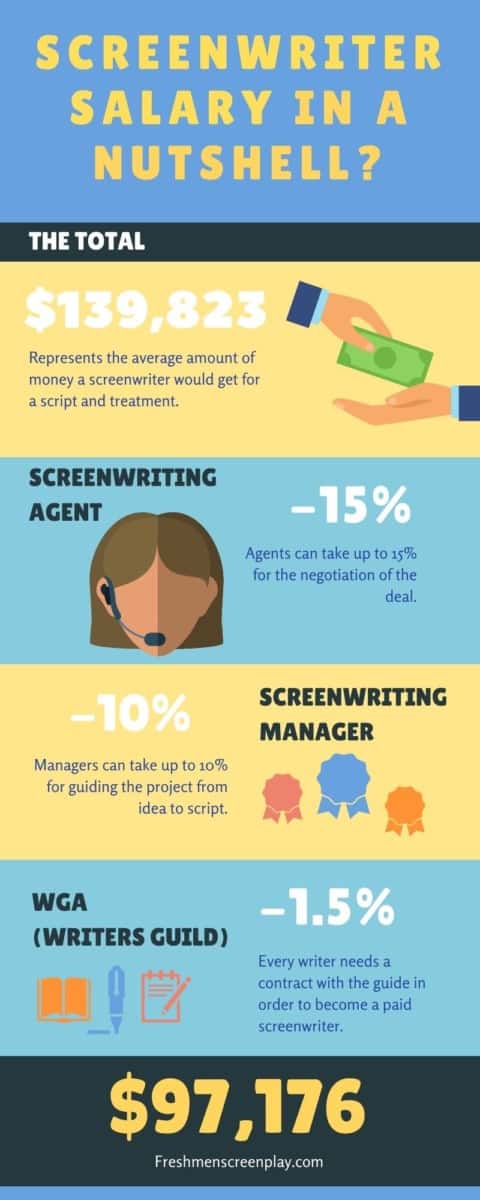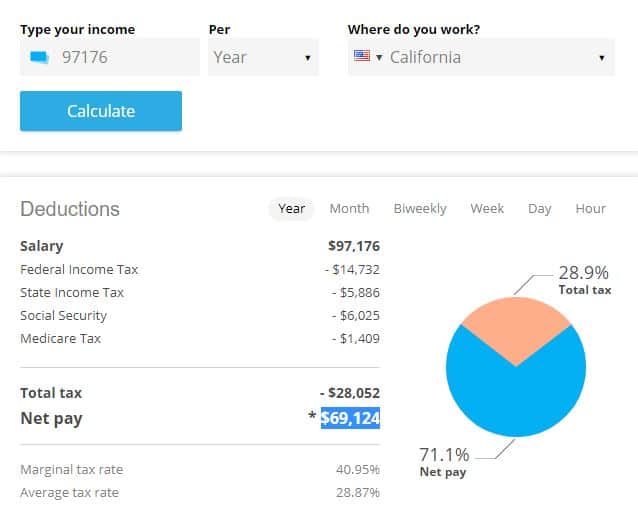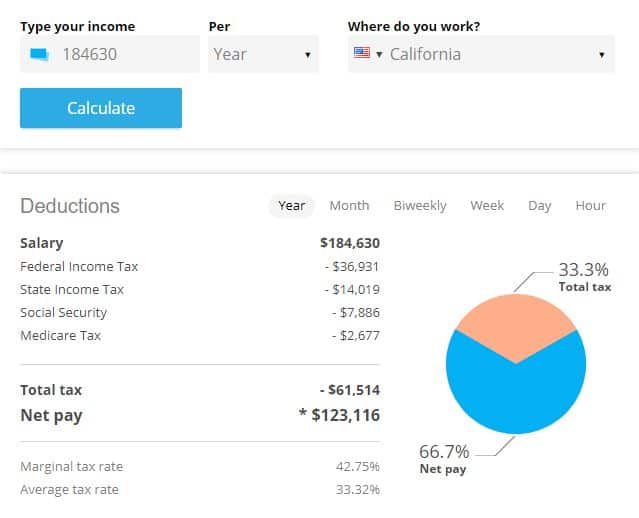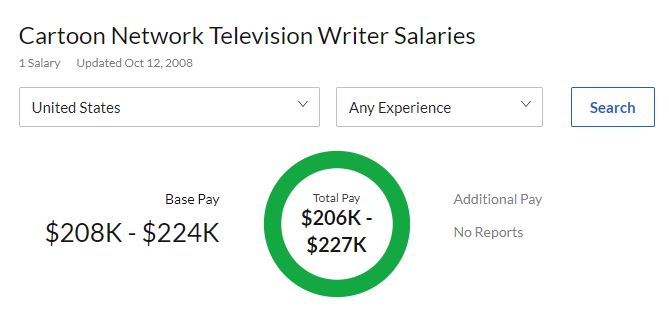So you’re interested in becoming a screenwriter.
So does everyone in LA.
A friend of mine just moved there to become the next Aaron Sorkin.
I wished him the best, but one question came up that he nor I had an answer to.
How much is he going to make as a screenwriter?
Both of us being writers haven’t thought about the financial aspect of making it as a writer.
My pondering turned into research, and that research turned into this MASSIVE post.
The following results are based on research in America, but I do answers for the United Kingdom and India towards the end.
How much do feature film screenwriters make? Feature film screenwriters make between $74,479 – $139,823 for an original screenplay including a treatment.
How much do TV screenwriters make? TV screenwriters make $26,566 per 30-minute episode and $39,072 per 60-minute episode on a prime-time network or high-budget programming channel.
This number changes every year according to the WGA (Writers Guild of America).
For example for the 2020-2021 season of shows TV writers get paid $26,832 per 30-minute prime time episode. And Feature film writers will then get between $76,341 – $143,319.
These are only the minimum payments a production company can offer you if you’re in the WGA.
Lets hear a professional speak about it.
Screenwriters have known to get upwards of 1 million for scripts, but that’s the top tear and shouldn’t be expected if you only have one or a few scripts under your belt.
What you need to know is all this money doesn’t come at once. And what if you’re not in the WGA? We answer those questions below.
Installment Payments for Feature Screenplays
The payment structure is broken down into three parts giving the studio the option to have another writer do the first or final draft if they choose.
But if you have a good relationship with the company, they will more than likely let you finish out the entire process.
It’s been known for writers only to get one or two of the cuts of the payment leaving multiple writers attached to the project.
The First payment is for a Film Treatment.
For feature films usually after a pitch before reading a script, a studio will ask for one.
A film treatment is typically the step between scene cards and the first draft of a screenplay. It provides a good demonstration of the highlights of the story.
The Second Payment is for the First Draft.
Studios aren’t expecting the final script here but they do want to see a completed one.
They will most likely have some notes giving adjustments for the third payment.
The Third Payment is for the Final Draft.
Production companies might have some minor adjustments after this, but for the most part, your job is done.
The payments are broken down with the amounts below:
| Film Treatment Payment | $55,882 |
| First Draft Payment | $55,882 |
| Final Draft Payment | $28,059 |
| Total | $139,823 |
What if You didn’t Write a Treatment?
If you didn’t write a film treatment and a company wants to buy your original script outright the cap is $102,435.
But this is what most writers get when they break into the industry for your first feature film.
No one is asking for a treatment from a no named writer. Agents typically have script readers read hundreds of spec scripts until they find gold.
Installment Payments for TV Screenplays
The breakdown is a lot simpler for TV writers
The research below is for a 30-minute prime time episode.
The First Payment is for The Story Treatment.
A story treatment is written a little differently than a film treatment. and because of that, you get paid differently too.
But, the basics still apply. It’s an outline for the story.
The Second Payment is for The Teleplay.
The teleplay is the blueprint for one episode of your T.V show.
Those payments are below:
| Story Treatment | $8,858 |
| Teleplay | $19,053 |
| Total one episode | $27,911 |
What if you write a movie for TV?
Some channels do have their original movies such as Lifetime, Disney, etc. So for 120 minutes or less (but more than 90 minutes)
NON-EPISODIC TV program – $79,058
Complete Financial Deductions for film and TV payments
At this point, you probably know the power of an agent, manager, lawyer, etc. Right?
Why?
Most companies no longer accept unsolicited scripts from writers.
A few places do check out this post for more on that.
But, this isn’t the 90’s anymore even online distributors Like Netflix has in their guidelines they won’t read anything without an agent.

At the bare minimum, you need an agent to get exposure. Yes, you can sell a script without an agent. But it might not be worth the trouble.
These people keep you working and keep you paid. But they come with a price.
There are also taxes on the money that comes in.
Let’s add up the deductions and give a complete estimate on how much a feature film writer and tv writer would get by the end.
Feature Film writer Pay Deduction Example
Say you sell a feature film with the treatment for the high-end price today of $139,823.
Screenwriting agent cost 15% (This number is subject to change)
Screenwriting manager cost 10% (If you have one)
Lawyer costs 5% (This depends on how much you use them in the process. It could be 0%. But for the example, we are using 5%.)
WGA dues – 1.5% of total payment + $25.00 (No way around this one.)
The $25.00 is the payment per year you have to pay to keep your membership.
I included this here because since you have to pay it anyway, it might as well come out your first check.
Leaving you with $97,176 for your script.
Now let’s break down the taxes say in California where most writers live and breathe.
If you’re in a different state, you can do this by going to https://neuvoo.com/tax-calculator

$69,124 is your take-home. Not bad at all. But if you write and sell two scripts with treatments year, this number becomes $138,248.
TV Writer Pay Deduction Example
Say you sell a TV script including the original story on a prime time network for $26,566.
Screenwriting agent cost 15%
Screenwriting manager cost 10%
Lawyer costs 5%. (This depends on how much you use them in the process. It could be 0%.)
WGA dues – 1.5%
This leaves you with $18,463 an episode for your script.
If you run a typical 10 episode season, you would end up with $184,630 for the year.
Some shows do 12 or even 22 episodes a season, but TV is slowly changing. Now let’s do the taxes in California once more.

$128,317 not bad.
Who gets paid more TV or feature film screenwriters?
From the examples I gave above you would assume that TV writers get paid more.
You would be right!
Well, in some cases.
T.V writers generally get paid more than feature film writers.
Remember this is just an example.
TV writers can also be feature writers and vice versa.
Someone might do one feature but get hired for rewrites for someone else’s work. The options are endless.
And remember these are prime time numbers most TV writers aren’t on prime time.
It also depends on the residual income from DVD sales streaming services etc.
We discuss all these additional forms of payment later in the article.
But it’s safe to say from my research, TV writers have more consistent income, but the possibility for making million per script only come from feature films writing.
Script Optioning
Script optioning is where the writer gives a producer exclusive rights to the screenplay for a certain period.
In which time the producer will try to cast, or finance the film. If they can, then they will then outright buy it from you.
Script optioning is a sweet deal because the producer then doesn’t have to pay all the installments for a script that will never get made.
Also, the screenwriter can make some money instead of their script sitting around collecting dust.
Theatrical scripts can be optioned for up to 18 months where the writer will get no less than 10% of the sale price of the entire screenplay.
And at least 10% more every 18 months the script is still optioned. The sale price is usually worked out between the manager and the producer.
Going back to our example this would be $13,982 for 18 months.
Television scripts are optioned for a total of 180 days with the writer getting 5% of the total payment.
And 10% for each additional 180 days. going back to our example this would be $2,656 for 180 days
If you’re a newer writer this could sound awesome and first and depending on how broke you are this could be a lifesaver.
But, for more experienced writers with a few scripts sold this could also mean development hell.
When a script is in a cycle of the never-ending meeting and runarounds.
Sometimes it eventually gets made sometimes not. It sucks especially when it could have been sold to someone else who would have bought and made it Immediately.
Remember having a final writer’s credit on a made film project is your best resume.
Studios and production companies watch films for talent all the time and seeing your name multiple times does more for your career long term than the quick optioned cash today.
A Screenwriter Salary As a Non-WGA Member
This is a different ball game.
So your not a member of the WGA and your just strictly trying to do it by yourself with no agent no manager no anything.
Just you the page and your contacts from film school.
Well, you will get paid less.
like a lot less!
A typical free agent screenwriter will make anywhere from $2,500 – $5,000 for a feature script or $50.00 per page for a short film or rewrites according to John August a professional screenwriter.
Many films at Sundance and other festivals were written by writers with zero connection to the Hollywood or the WGA machine.
The guild does offer indie contracts writers can use if they feel like they need some protection over their work.
If you were trying to strike a deal with a studio for your spec script all on your own, you could get without any representation, but the guild will call you that day.
As soon as you sign that deal.
Leaving you $2,500 in the hole as the sign-up fee, not including the 1.5% of whatever you and the studio agreed on.
The most significant benefits for signing up with WGA are the following:
| Health Insurance | As long as you make at least $38,685 from writing you eligible. |
| Credit Union | SAG-AFTRA Federal Credit Union (SAFCU) |
| Special Discounts | As a writer, you receive restaurants, lodging, and product offered just to people in the WGA. |
| Minimum PaymentsAnyone wanting to hire you to write can not pay you less than the guaranteed minimums we have listed above. You can decide to wave this for individual projects if need be. |
When does a Screenwriter get Paid?
Feature film screenwriters get paid after the delivery of each section of the script.
After the treatment is submitted the writer will get paid.
Next, the writer would be given 12 weeks to provide the first draft of the script.
John August has on his blog suggest the 12-week rule is never really enforced; one of the producers will give you a call to find out a ballpark answer.
The more experienced you are as a writer, the more lenient of a time frame you will have.
For example, I’ve heard Aaron Sorkin say that producers blow up his phone because hes taking too long but ultimately they give him as much time as he needs.
Rewrites for the final draft are given a shorter time frame between 2 and eight weeks.
As far as the time frame from the delivery date the screenwriter will get paid 48 hours after the date and no later than seven days anything further else is illegal.
How much do Screenwriters Make in Residuals and Royalties?
Residuals
Do Feature film writers get residuals? Yes, writers will receive residual compensation of 1.2% of distributors gross earnings but only to those with the final writer’s credit.
Final credit meaning you receive one of the following after the release of the film:
- Written by
- Story by
- Screen Story by
- Screenplay by
- Adaptation by
- Narration Written by
Keep in mind this can be broken down between several writers.
You will sometimes see the story by and written by being two different people.
Remember earlier in the article when I stated that the writer who creates the story, treatment, book, comic, etc. is different from those who might have adaptation or wrote the final draft of the script.
Both writers receive 1.2%.
Where do The Residuals Come From?
The residuals come from free TV, cable, rented, steamed, etc. Playbacks of the films.
Residuals also include every time ads are placed at commercial breaks and even in airplanes.
So if you’re on a flight and see your film play it over, however, don’t expect any residuals for theatrical releases.
Do TV screenwriters get residuals? Yes, writers will receive $8,778 for a 30-minute episodic and $17,012 for a 60-minute for being the credited writer on a prime-time network. If you wrote the teleplay and created the story, you get $13,511 for the 30-minutes and $24,558 for the 60-minute.
What are the prime-time networks?
ABC, CBS, FBC, and NBC. If you’re on a different network, you still get residuals don’t worry just cut those numbers by thirds.
The final credits are slightly different for a TV they include:
- Written by
- Story by
- Television Story by
- Teleplay by
- Adaptation by
- Narration Written by
- Created by
For television documentary programming:
- Writer
- Written by
- Documentary Script by
- Continuity by
- Special Material/Interview Material by
- News Staff
- News-writer
- Narration Written by
- Tele-script by
- Story by
Seinfeld one of my favorite TV shows has been playing since the ’90s, and the reruns hit NBC and TBS on a daily basis.
Jerry Seinfeld makes $13,511 almost every day that’s about $4 million every year since the year 1989 of the first show.
The rules of the WGA might have been different back then, and so was the pay so this is only speculation.
I go into more detail on the residuals here
If you have any questions about the residual process, please contact the WGA residual department at (323) 782-4700 for details. Or if you want to understand how they place the writers, final credit click here.
Royalties
Do screenwriters get royalty payments? No. They only get residuals which is a type of royalty.
The difference being royalties have to do with ownership of the intellectual property.
As a screenwriter, if you get the final credit because your name is on the final version of the product, they will pay you every time it’s shown.
But the person who pays you owns the film itself aka the studio.
Why Screenwriter Salaries don’t Exist
A salary by definition is a fixed, regular payment, typically paid on a monthly or biweekly basis but often expressed as an annual sum, made by an employer to an employee.
As a screenwriter, your not an employee you don’t get paid on a biweekly basis.
You function more like a contractor going from job to job.
Most screenwriters go long periods without work sometimes years if they don’t have relationships with existing studios.
Keep this in mind when pursuing the writing profession.
Yes, there are success stories of writers getting millions for scripts selling over and over, but this is the top 1%.
You are consistently writing stuff that is never picked up or optioned. This is the life of a creator and where most creative professionals are working.
Selling Prices for Your First Screenplay
How much does a writer get for selling their first screenplay? A writer will get anywhere between $74,479 – $139,823 for
This number doesn’t change because it’s your first script.
But it could change because it’s for the 5th script.
Once you become a named screenwriter meaning people know you from credits and love your work this number can shoot up tremendously.
The trick is getting to 5 sold scripts.
Now in the ’90s the way people did business was different.
For example, it’s documented that Quentin Tarantino got $50,000 for his film Reservoir Dogs. Which included writing, acting, and directing in the film.
Taking into account inflation, this would be $90,000 today. Thank god for the WGA.
How Much do Animation Screenwriters Make?
How Much do American Animation Screenwriters Make?
All I could find is the WGA negotiates for you. Take a look at the screenshot below for the full wording.

I have made a call to them to figure out more about how this works. The response was…
“We don’t have a different figure for animation it’s the same if they were regular films.”
I’ve also done a little digging to find out if this was true. It seems all the same to me.

American animation writers according to Glassdoor get aware from $206,000 – $227,000 to write.
I’m guessing this is every year and is considered a salary since Animation is different from
How much do Japanese Anime writers make?
I went everywhere for this information but found close to none.
All I know is the pay for the Japanese animation industry as a whole is low extremely low as in $2,000 a month.
It’s a struggling industry and me being a big fan, I hope it finds a way to monetize better.
For example, the director will only get about $58,540 a year, and it’s all downhill from that number.
Who are the Highest-Paid Screenwriters?
These are pure screenwriters, meaning they do nothing else but write.
You only get here by hard work, talent, and meeting the right people.
The purpose of this shortlist is to prove that there is light at the end of the tunnel every screenwriter doesn’t have to make $79,000 a year aim higher.
Simon Kinberg
$8 million for writing X-Men Apocalypse and Days of Future Past with $350,000 as working pay.
Phil Lord and Chris Miller
$400,000 a week just in rewrites.
David Koepp
$3 million for writing Panic Room.
Shane Black
$4 million for writing The Long Kiss Goodnight.
Terry Rossio and Bill Marsilii
$5 Million for writing dejavu.
Why 99% of Writers Don’t Make Money
After all, the research I’ve done from this post. Came from calling, emailing, reading the corners of the internet.
I’ve found one thing to be true over everything. Most screenwriters don’t make any money.
Who are these people?
Hundreds of thousands of writers enter screenwriting competitions each year.
Hundreds of thousands of writers have no agent or manager.
These facts alone are proof.
Every studio including online streaming services won’t even read your script without representation.
And without that, you won’t make any money.
The Blacklist is an excellent place for writers and Hollywood reps to come together, but even there the writers who get most of the looks are the ones with the agents or the people who pay the most to the platform.
I’ve recently seen a video of a screenwriting teacher on film courage’s youtube channel expressing that about 2% of the people in his class have the talent and will go on to make a living. Living as we found out was $79,000.
Not the massive amounts we just went over in the last section.
Just be aware of the hard cold truth of the matter. Writing can bring you great joy, but in most cases, people are in it for the money.
If that’s the case become an agent.
I just don’t want you to leave this post disappointed that ten years from now you’re looking back at your life is ultimately a waste.
Conclusion
It’s not pretty but it can be, the most important thing is you get paid to do something that others dream of doing.
For those of you who aren’t turned away keep going.
For the complete breakdown of the minimums and increases coming in for writers the next year click here.
Tell me what you think.
Did I miss anything?
How much money did you think screenwriters made until now?
Related Questions
How much do screenwriters get paid in India?
Screenwriters in India make anywhere from 3 – 4 Indian Rupee that’s $4,365.86 – $5,821.15 per script if your a newer writer. And upwards of $65487.88 for a big-budget feature film.
How much do screenwriters get paid UK?
Screenwriters in the United Kingdom earn anywhere from £45-pound sterling that’s $55,325.67 per script for a film budget of $2 million or higher. And $33,691.92 for a budget film lower than $2 million.
Happy writing.

